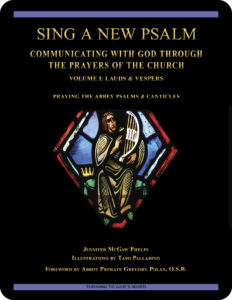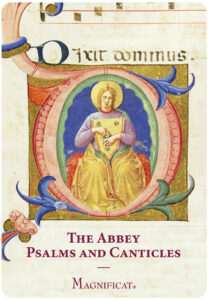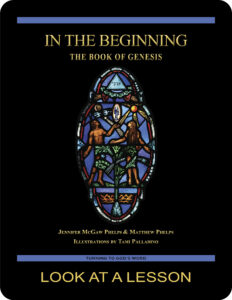 Sing a New Psalm:
Sing a New Psalm:
Communicating with God Through
the Prayers of the Church
Volume I: Lauds & Vespers
Lesson 25 What Is Man That You Regard Him?
Psalm 144 and Psalm 145
Thursday Vespers (Week II)
Revised Standard Version Catholic Edition (RSVCE)*
New American Bible Revised Edition (NABRE)*
Catechism of the Catholic Church
ex libris (in our library)
next lesson: Create a Pure Heart for Me
This material coordinates with Lesson 25 on pages 102–105 in Sing a New Psalm: Communicating with God Through the Prayers of the Church—Volume I: Lauds & Vespers. Our Catholic Bible study is based on The Abbey Psalms and Canticles, an English translation of the Psalms prepared by the monks at Conception Abbey in 2010 and first published as The Revised Grail Psalms. The Abbey Psalms and Canticles is a revision of that work, finished in 2020 and published by the United States Conference of Catholic Bishops (USCCB). Wording and numbering of some Psalms and verses in other translations may differ. This new translation of the Psalms in the process of being added to all English-language Liturgy of the Hours books used in the United States. The USCCB also plans a liturgical Bible based on the NABRE translation.
The Abbey Psalms and Canticles, an English translation of the Psalms prepared by the monks at Conception Abbey in 2010 and first published as The Revised Grail Psalms. The Abbey Psalms and Canticles is a revision of that work, finished in 2020 and published by the United States Conference of Catholic Bishops (USCCB). Wording and numbering of some Psalms and verses in other translations may differ. This new translation of the Psalms in the process of being added to all English-language Liturgy of the Hours books used in the United States. The USCCB also plans a liturgical Bible based on the NABRE translation.
“Unlike other prayers in sacred Scripture, the prayers contained in the Psalms are not inserted into a narrative story that specifies their meaning and function. Instead, the Psalms are given to the believer precisely as a text of prayer. Since they are the Word of God, the believer who prays the Psalms speaks to God using the very words that God himself has given to us. Thus, in praying the Psalms we learn to pray. The Psalms are a school of prayer.”—Pope Benedict XVI
welcome to our in-depth study of the Psalms
We invite groups and individuals to check out the sample first lesson from this 28- lesson Turning to
lesson Turning to  God’s Word Catholic Bible study. Our online study pages include additional questions, commentary, and prayers based on the Psalm texts. Sing a New Psalm: Communicating with God Through the Prayers of the Church—Volume I: Lauds & Vespers has been granted an imprimatur. A digital version of this study can be purchased from our website shop. Volume II: Vigils, Day Prayer & Compline is scheduled for publication in 2025. If you have a Bible-related question or comment, click on one of the “ask us your question” or “what do you think” buttons on any online study page.
God’s Word Catholic Bible study. Our online study pages include additional questions, commentary, and prayers based on the Psalm texts. Sing a New Psalm: Communicating with God Through the Prayers of the Church—Volume I: Lauds & Vespers has been granted an imprimatur. A digital version of this study can be purchased from our website shop. Volume II: Vigils, Day Prayer & Compline is scheduled for publication in 2025. If you have a Bible-related question or comment, click on one of the “ask us your question” or “what do you think” buttons on any online study page.
open with prayer
It’s always wise to begin any Bible study with prayer, whether reading the Scriptures alone or meeting with others in a discussion study group. You can pray using your own words, pray one of the Psalms in this lesson, or use one of the opening prayers on our website. We especially like the following:
Lord Jesus, you promised to send your Holy Spirit
to teach us all things.
As we read and study your word today,
allow it to touch our hearts and change our lives. Amen.
what does humanity look like in God’s eyes?
“What Is Man that You Consider Him?” reflects the Psalmist’s awe in the face of the vastness of the  created universe. Turning to God’s Word co-founder Tami Palladino’s illustration shows a figure gazing in wonder at the night sky. The Psalmist anticipates a popular literary theme. In Shakespeare’s Hamlet, the lead character is given monologue that marvels at the intricate complexity of human beings and ends with recognizing their insignificance: “What a piece of work is a man! How noble in reason, how infinite in faculty! In form and moving how express and admirable! In action how like an Angel! In apprehension how like a god! The beauty of the world! The paragon of animals! And yet to me, what is this quintessence of dust?” The 1979 rock musical Hair somewhat irreverently turned Hamlet’s speech into song lyrics. Click on Tami’s illustration (right) to enlarge it. Her original illustration is on page 103 in Sing a New Psalm: Communicating with God Through the Prayers of the Church—Volume I: Lauds & Vespers.
created universe. Turning to God’s Word co-founder Tami Palladino’s illustration shows a figure gazing in wonder at the night sky. The Psalmist anticipates a popular literary theme. In Shakespeare’s Hamlet, the lead character is given monologue that marvels at the intricate complexity of human beings and ends with recognizing their insignificance: “What a piece of work is a man! How noble in reason, how infinite in faculty! In form and moving how express and admirable! In action how like an Angel! In apprehension how like a god! The beauty of the world! The paragon of animals! And yet to me, what is this quintessence of dust?” The 1979 rock musical Hair somewhat irreverently turned Hamlet’s speech into song lyrics. Click on Tami’s illustration (right) to enlarge it. Her original illustration is on page 103 in Sing a New Psalm: Communicating with God Through the Prayers of the Church—Volume I: Lauds & Vespers.
read the Catechism—how well do you know your faith?
In Psalm 144, the Psalmist asks the LORD to come down from heaven. Christians understand that the Incarnation was the method that God chose. Paragraphs 457–460 in the Catechism of the Catholic Church list four reasons for the Incarnation. Can you name these reasons without looking at the Catechism?

 ? What does the Incarnation mean to you?
? What does the Incarnation mean to you?
? Which of the four reasons for the Incarnation taught by the Church do you consider to be the most important to your spiritual well-being?
? Explain the reason for your choice.
? Consider which one of the four reasons you think is the most difficult to understand. What do you think makes it so challenging?
WHAT DO YOU THINK about these big questions about life?
Men and women, whether we profess to be religious or not, are besieged by a number of basic questions concerning our existence.
 ? Who are we?
? Who are we?
? Where did we come from?
? Where are we going?
? What’s our purpose?
? For the Psalmist, whose faith in God is a given, the big questions about which he wonders don’t so much concern what men and women are and where we came from. Instead, the Psalmist wonders why God cares for such frail and wretched creatures. Why do you think it is that God cares so much for humanity?
ex libris—large & small mysteries of the universe
 If you like to ponder the mysteries of the world that God’s created, you might appreciate reading the Pulitzer Prize-winning book, Pilgrim at Tinker Creek by Annie Dillard.
If you like to ponder the mysteries of the world that God’s created, you might appreciate reading the Pulitzer Prize-winning book, Pilgrim at Tinker Creek by Annie Dillard. A work of non-fiction, this beautifully written book focuses on an immense number of scientific peculiarities found in the natural environment of a creek in Virginia. In these remarkable marvels of nature, the author sees undeniable evidence of God. This book can inspire readers to more closely examine similar natural evidence present in our own lives. Read excerpts and learn more about Pilgrim at Tinker Creek and other works related to Bible study at ex libris—main bookshelf.
A work of non-fiction, this beautifully written book focuses on an immense number of scientific peculiarities found in the natural environment of a creek in Virginia. In these remarkable marvels of nature, the author sees undeniable evidence of God. This book can inspire readers to more closely examine similar natural evidence present in our own lives. Read excerpts and learn more about Pilgrim at Tinker Creek and other works related to Bible study at ex libris—main bookshelf.
 joy—you could look it up in our archives
joy—you could look it up in our archives
In Psalm 145, the Psalmist announces that people throughout history will sing of the LORD’s. To learn what “joy” is and about Jesus’ promise to those who follow God’s commandments, read Lost in Translation, an online column in which Turning to God’s Word author Matthew Phelps helps readers connect with ideas expressed in the original languages of the Scriptures. New Lost in Translation entries are posted on Mondays, and past entries are archived on our website. Contact us if you’d like to receive Lost in Translation by email every week.
 the popes inspire us—what is divine kingship?
the popes inspire us—what is divine kingship?
In “The LORD Is Faithful & Holy” on page 105 in Sing a New Psalm: Communicating with God Through the Prayers of the Church—Volume I: Lauds & Vespers, an excerpt from a papal audience, Pope Benedict XVI describes the divine kingship of God not in terms of a haughty exercise of human power, but instead the Holy Father sees a sovereign who is just in all his ways and kind in all his actions. God’s reign is marked by concern for the most helpless in society.
Q&A—spirits behind the words in Greek language
A participant in one of our Bible study groups has encountered an idea from Greek philosophy and is curious about how it might relate to our study of the Psalms.
Q: Is it true that the Greeks believed there were spirits behind the words they used in their language?
A: According to Turning to God’s Word author Matthew Phelps (who has a degree in classical languages with an emphasis on Greek), this isn’t generally part of the study of the Greek language. The idea comes from the philosopher Plato, who developed his theory of forms around non-physical ideas expressed by words that represent things existing in reality. Much of Plato’s philosophy is about extrapolating language to these abstract forms. It wasn’t a way of thinking common to the Hebrews, so it wouldn’t be a factor when the Psalms were translated from Hebrew to Greek for inclusion into the Septuagint.
a more in-depth answer
We’ve previously responded in greater depth to a similar question in connection with our study of the book of Genesis. Perhaps that earlier question was from the same person. Here’s a link to our previous response, which can be found on the online study page for Lesson 9 Abram Questions the Lord GOD in the Turning to God’s Word Catholic Bible study In the Beginning: The Book of Genesis.
with our study of the book of Genesis. Perhaps that earlier question was from the same person. Here’s a link to our previous response, which can be found on the online study page for Lesson 9 Abram Questions the Lord GOD in the Turning to God’s Word Catholic Bible study In the Beginning: The Book of Genesis.
the best Catholic commentary about Scripture
 To find out more about how Church teaching is supported by passages in Sing a New Psalm: Communicating with God Through the Prayers of the Church—Volume I: Lauds & Vespers, check out the Index of Citations in the Catechism of the Catholic Church. Links to the primary Scripture passages in the lesson (Revised Standard Version Catholic Edition [RSVCE*]) and relevant paragraphs in the Catechism are provided here. Not every passage in the biblical text for this study is referenced in a Catechism paragraph, however, including Psalm 144 in this lesson.
To find out more about how Church teaching is supported by passages in Sing a New Psalm: Communicating with God Through the Prayers of the Church—Volume I: Lauds & Vespers, check out the Index of Citations in the Catechism of the Catholic Church. Links to the primary Scripture passages in the lesson (Revised Standard Version Catholic Edition [RSVCE*]) and relevant paragraphs in the Catechism are provided here. Not every passage in the biblical text for this study is referenced in a Catechism paragraph, however, including Psalm 144 in this lesson.
Psalm 145:3—paragraph 300
Psalm 145:9—paragraphs 295, 342
don’t forget about our indexes & extra online material

 If you’re trying to locate information about a specific Scripture passage, you can look it up in the index at the back of the study book or sample lesson. If you want to find a particular commentary, you can look up its title in the topics index. To learn more about another book of the Bible for which there’s a Turning to God’s Word study, visit the online study directories to read the commentaries and watch any accompanying videos. Finally, if you have a question or would like to make a comment about any of our studies, you can use one of the “ask us your question” or “what do you think” buttons to email our authors.
If you’re trying to locate information about a specific Scripture passage, you can look it up in the index at the back of the study book or sample lesson. If you want to find a particular commentary, you can look up its title in the topics index. To learn more about another book of the Bible for which there’s a Turning to God’s Word study, visit the online study directories to read the commentaries and watch any accompanying videos. Finally, if you have a question or would like to make a comment about any of our studies, you can use one of the “ask us your question” or “what do you think” buttons to email our authors.
ex libris—Church documents & books about religious topics
Link to magisterial documents referred to in our Bible studies at ex libris—magisterial documents.  This listing includes significant recent encyclicals as well as a number of historical Church documents. Recommended books related to Scripture study can be found at ex libris—main bookshelf.
This listing includes significant recent encyclicals as well as a number of historical Church documents. Recommended books related to Scripture study can be found at ex libris—main bookshelf.
wondering how to pronounce some of these words?
The following links are to readings from the New International Version (NIV) Bible. To listen, open one of the links and click on the audio icon above the printed text. Although not taken from the translations used in our study materials, the NIV readings provide an audio guide to pronunciation of words in this lesson’s primary biblical texts. A close online version of the translation of the Bible used in Catholic liturgy in the United States as well as an audio guide for daily Mass readings for the current month can be found on the website of the United States Conference of Catholic Bishops (USCCB).
Psalm 144 (NIV)
Psalm 145 (NIV)
 close with a Psalms-based prayer for Thursday Vespers (Week II)
close with a Psalms-based prayer for Thursday Vespers (Week II)
Many of our Catholic study groups like to conclude their discussions with a prayer based on the scriptural focus of their lesson. If you’re uncomfortable composing your own Bible-based prayers, you can follow our four easy steps. If you prefer, you can pray any of the Psalms in this lesson, or you can use the following short prayer.
O God, you watch over your people
to rescue us whenever we call.
Keep us mindful of your great love.
Grant that we may begin to repay with a generous spirit
your many kindnesses by caring wholeheartedly
for the other people whom you have placed in our lives.
We ask this in the name of your Son, Jesus Christ,
who chose a lowly position of service
in order to show us the way to love. Amen.
Lesson 26 Create a Pure Heart for Me, Friday Lauds (Week II)—Psalm 51, Psalm 108, and Psalm 147:12–20
Lesson 24 I Will Walk with Blameless Heart, Thursday Lauds (Week II)—Psalm 101, Psalm 143, and Psalm 147:1–11
you also may like our study of the book of Genesis
 The first seven lessons of In the Beginning: The Book of Genesis, a 28-lesson Catholic Bible study with an imprimatur, provide an in-depth look at the very earliest biblical history—including the two accounts of Creation, events surrounding the Fall of Adam and Eve, the relationship between Cain and Abel, and the baptismal foreshadowing present in the account of Noah and the Flood. Remaining lessons look at lives of the patriarchs Abraham, Isaac, Jacob, and Joseph. Click on the book’s cover to view a sample lesson.
The first seven lessons of In the Beginning: The Book of Genesis, a 28-lesson Catholic Bible study with an imprimatur, provide an in-depth look at the very earliest biblical history—including the two accounts of Creation, events surrounding the Fall of Adam and Eve, the relationship between Cain and Abel, and the baptismal foreshadowing present in the account of Noah and the Flood. Remaining lessons look at lives of the patriarchs Abraham, Isaac, Jacob, and Joseph. Click on the book’s cover to view a sample lesson.
start a Turning to God’s Word Bible study
Thank you for your interest in Sing a New Psalm: Communicating with God Through the Prayers of the Church—Volume I: Lauds & Vespers. 
 More information about beginning a Turning to God’s Word Bible study can be found on this website at start a Bible study, and Tami, Matthew, and I are available to answer questions or discuss concerns. Contact us to start this or one of our other studies or to have your schedule listed with other TtGW study groups on our website. —Jennifer
More information about beginning a Turning to God’s Word Bible study can be found on this website at start a Bible study, and Tami, Matthew, and I are available to answer questions or discuss concerns. Contact us to start this or one of our other studies or to have your schedule listed with other TtGW study groups on our website. —Jennifer
*There are seven deuterocanonical books in the Old Testament—the Books of Tobit, Judith, Wisdom, Sirach, Baruch, and First and Second Maccabees, as well as some passages in the Books of Esther and Daniel. Protestants usually refer to these works as “apocryphal,” a word that means “outside the (Protestant) canon” because they’re excluded from most Protestant Bibles. The word “deuterocanonical” means “second canon”; Catholics use that word to refer to any section of the Catholic Old Testament for which there are no extant, or existing, Hebrew manuscripts. All of the deuterocanonical books appear in the Septuagint, the earliest remaining versions of which date to the 1st century B.C. This Greek translation of the Old Testament was in common use by Jews at the time of Jesus. Learn more by reading How Do Catholic & Protestant Bibles Differ?
Turning to God’s Word printed Bible studies use the 2006 Revised Standard Version Second Catholic Edition (RSV2CE) translation for all Scripture references except the Psalms, which are taken from The Abbey Psalms and Canticles, prepared by the monks of Conception Abbey and published in 2020 by the United States Conference of Catholic Bishops (USCCB). All Scripture links for the online study pages for Sing a New Psalm: Communicating with God Through the Prayers of the Church—Volume I: Lauds & Vespers are to the 1966 Revised Standard Version Catholic Edition (RSVCE) translation. The New International Version (NIV) audio recordings follow the same chapter and verse numbering as the RSV Catholic translations, but the NIV doesn’t include the deuterocanonical passages.
The 1966 RSVCE uses archaic pronouns and verb forms such as “thee,” “thou,” “didst” in the Psalms and in direct quotations attributed to God. The 2006 RSV2CE replaces these with more accessible English. The few significant translation changes in the RSV2CE include rendering almah as “virgin” in the Book of Isaiah 7:14 and restoring the term “begotten” in the Gospel According to John 3:16.
The Psalms in this Bible study reflect numbering used in The Abbey Psalms and Canticles; Psalms numbering may vary in other translations. Numbering also may vary for a few other passages in this Bible study. Turning to God’s Word studies follow the numbering in the Revised Standard Version Catholic translations (RSVCE and RSV2CE). Discrepancies in the New American Bible Revised Edition (NABRE) are noted in the Index of Scripture Citations in the study book and the online sample.
 The companion to this Catholic Bible study from Turning to God’s Word, Sing a New Psalm: Communicating with God Through the Prayers of the Church—Volume II: Vigils, Day Prayer & Compline, will cover Psalms not included in Volume I: Lauds & Vespers. Volume II: Vigils, Day Prayer & Compline is scheduled for publication in 2025.
The companion to this Catholic Bible study from Turning to God’s Word, Sing a New Psalm: Communicating with God Through the Prayers of the Church—Volume II: Vigils, Day Prayer & Compline, will cover Psalms not included in Volume I: Lauds & Vespers. Volume II: Vigils, Day Prayer & Compline is scheduled for publication in 2025.
